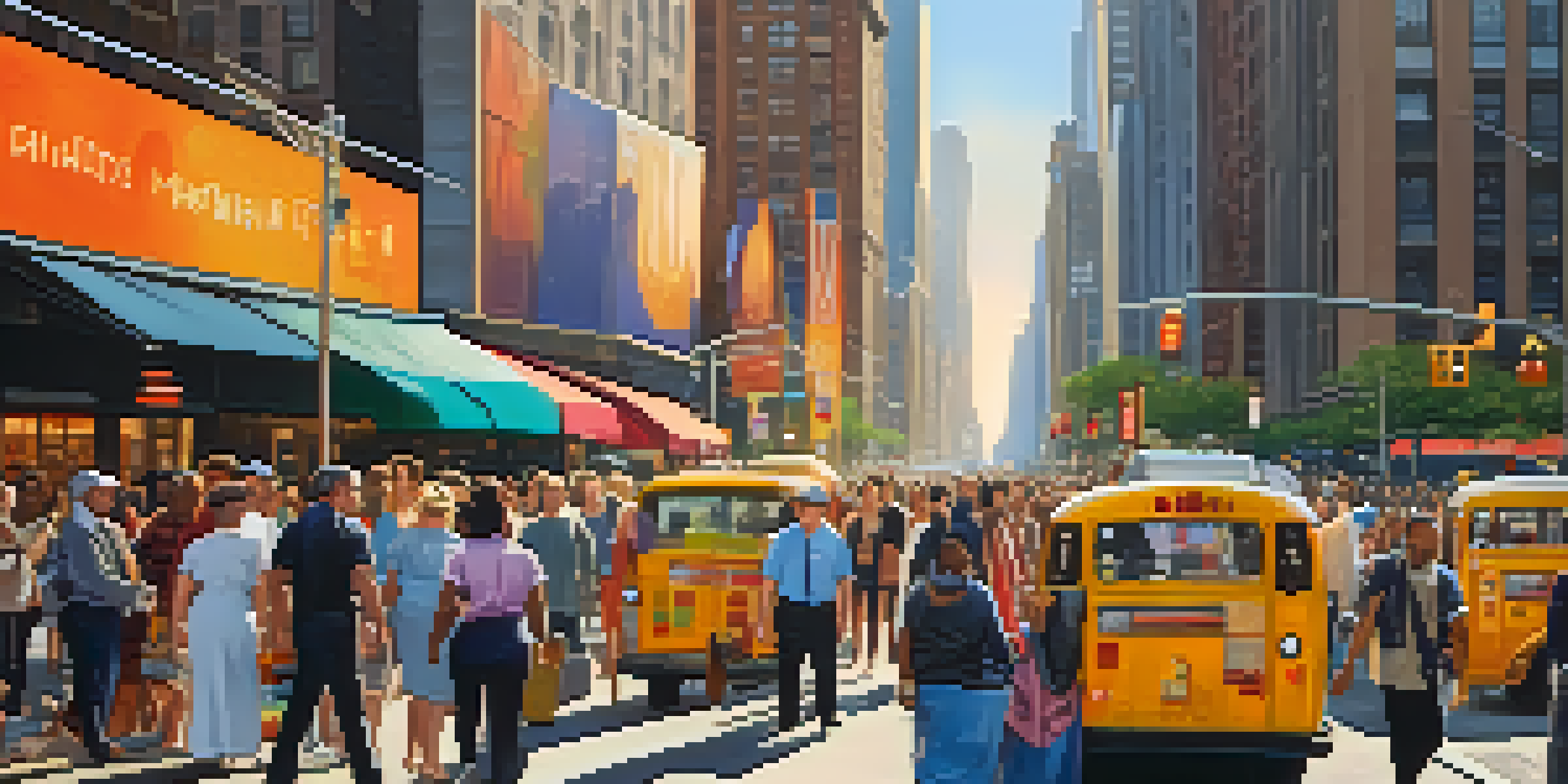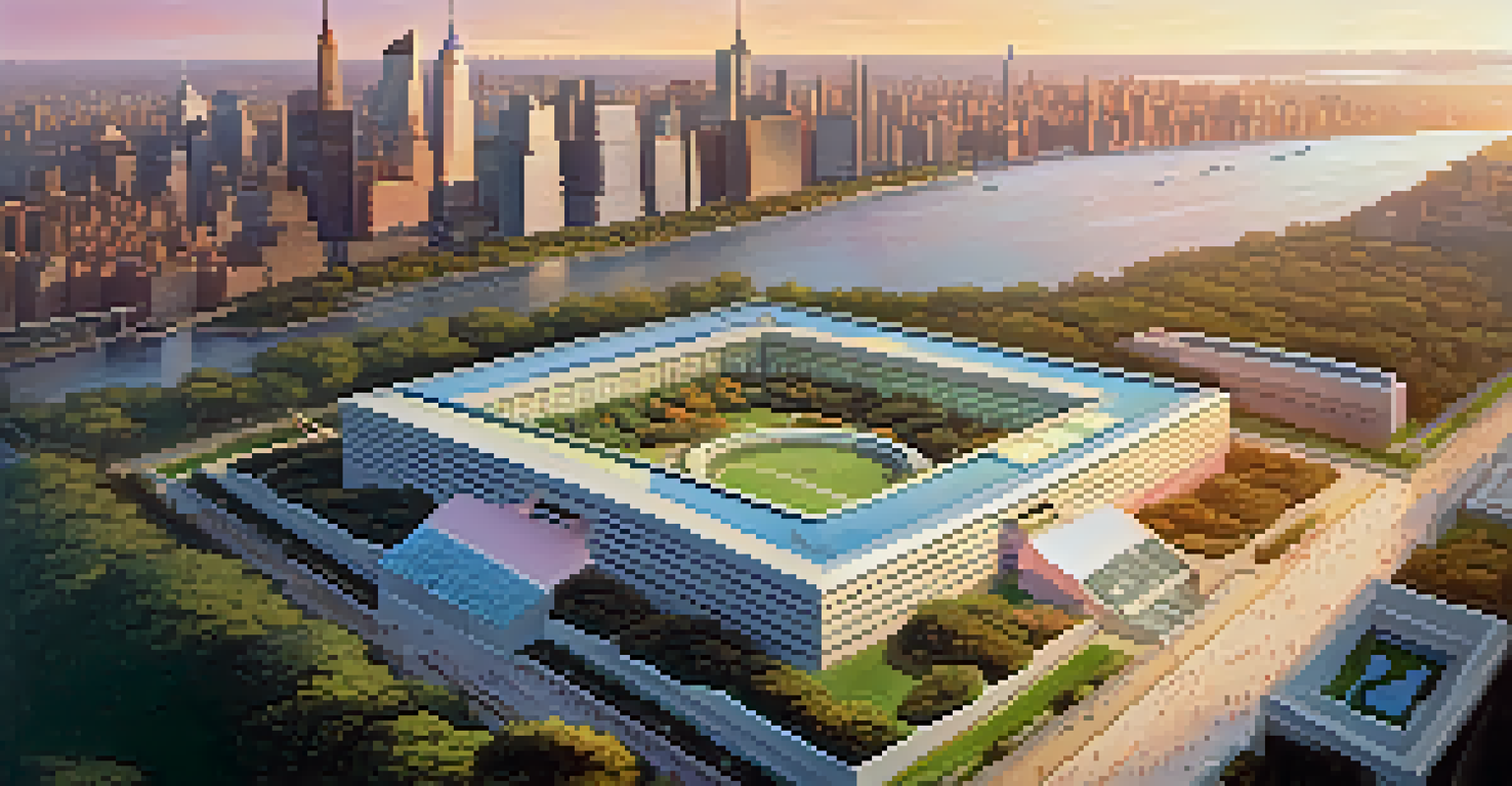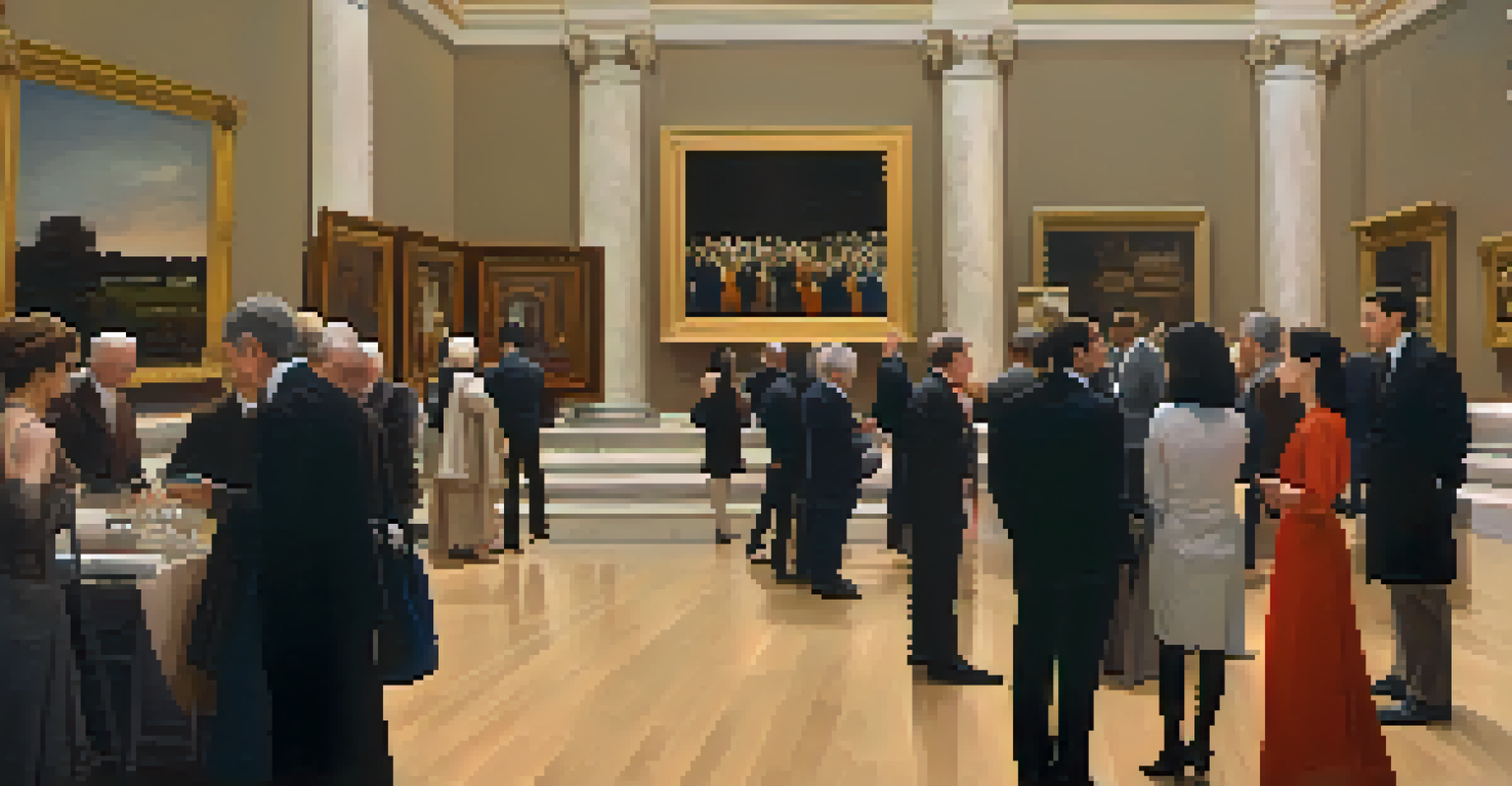New York City: A Hub for International Economic Diplomacy

The Historical Significance of New York City
New York City has long been a melting pot of cultures, and this diversity extends to its economic landscape. Since the early 20th century, NYC has attracted businesses and entrepreneurs from around the world, making it a key player in global trade. The city's strategic location and robust infrastructure have only enhanced its role as an international economic hub.
New York is not a city – it’s a world.
Historically, events like the establishment of the United Nations in 1945 positioned NYC as a center for diplomacy and international relations. This legacy continues today, with countless embassies and consulates located within the city. The combination of historical significance and modern relevance makes NYC a focal point for economic diplomacy.
Moreover, NYC’s rich tapestry of immigrant stories adds depth to its economic narrative. Each wave of new residents has contributed unique perspectives and innovations, reinforcing the city’s reputation as a global leader. This dynamic environment fosters collaboration and dialogue among nations, further solidifying NYC's role in economic diplomacy.
Key Institutions Driving Economic Diplomacy
Several institutions in New York City play pivotal roles in shaping international economic policies. The United Nations, headquartered in Manhattan, serves as a forum for member states to negotiate and implement economic agreements. Additionally, organizations like the World Bank and International Monetary Fund have significant offices in the city, influencing global financial strategies.

Local government agencies also contribute to this ecosystem by promoting foreign investment and trade. For example, the New York City Economic Development Corporation actively works to attract international businesses, showcasing the city as a prime location for economic activities. Their efforts create a welcoming environment for foreign diplomats and investors alike.
NYC: A Global Economic Hub
New York City's strategic location and rich cultural tapestry make it a key player in international trade and economic diplomacy.
These institutions not only facilitate dialogue but also provide essential resources and support to businesses. By hosting conferences, workshops, and networking events, they encourage collaboration and strengthen economic ties between nations. This synergy is crucial for navigating the complexities of international trade and investment.
The Role of Financial Markets in Global Diplomacy
New York City is home to some of the world’s largest financial markets, including the New York Stock Exchange and NASDAQ. These platforms are not just for trading; they serve as barometers for global economic health. International investors flock to NYC, seeking opportunities and insights that can influence economic policies worldwide.
A city’s greatness is measured by the broadness of its vision and the height of its dreams.
The presence of major banks and financial institutions further amplifies this effect. These entities engage in cross-border transactions and investments, making NYC a central player in global finance. Their ability to manage vast sums of money allows them to impact economies around the globe, reinforcing the city’s role in economic diplomacy.
Moreover, the intricate relationship between finance and diplomacy becomes evident during economic crises or negotiations. Financial markets often react to geopolitical events, highlighting the interconnectedness of economies. This dynamic emphasizes the importance of NYC as a hub where finance and diplomacy converge.
Cultural Diplomacy and Economic Impact
Cultural diplomacy is an often-overlooked aspect of economic diplomacy, and New York City excels in this arena. Through art, music, and theater, the city showcases diverse cultures, fostering mutual understanding among nations. This cultural exchange can pave the way for economic collaborations, as countries seek to strengthen ties.
Institutions like the Metropolitan Museum of Art and the Lincoln Center not only serve as cultural landmarks but also as platforms for international dialogue. By hosting exhibitions and performances from around the world, they create spaces where ideas and economic opportunities can flourish. This cultural engagement is crucial for building relationships that extend beyond commerce.
Institutions Shaping Economic Policy
Key organizations like the United Nations and the NYC Economic Development Corporation drive international economic collaboration and investment.
Furthermore, cultural events often attract tourists and foreign investments, contributing to the city's economy. As visitors experience NYC's cultural richness, they are more likely to engage with local businesses and initiatives. This cyclical relationship highlights how cultural diplomacy can significantly impact economic outcomes in the city.
The Influence of Technology on Economic Diplomacy
As technology continues to evolve, its impact on economic diplomacy becomes increasingly pronounced. New York City, with its thriving tech scene, is at the forefront of this transformation. Startups and established companies alike leverage technology to facilitate international trade and communication, making economic diplomacy more efficient.
For instance, innovations in fintech enable seamless cross-border transactions, reducing barriers for businesses engaging in international trade. This technological advancement not only streamlines processes but also fosters trust among trading partners. As a result, NYC becomes a vital player in promoting economic cooperation through technology.
Moreover, the city's numerous tech conferences and events attract global leaders and entrepreneurs. These gatherings provide opportunities for networking and collaboration, further enhancing NYC's role in economic diplomacy. The blend of technology and diplomacy showcases the city's adaptability in an ever-changing global landscape.
Challenges Facing Economic Diplomacy in NYC
Despite its strengths, New York City faces several challenges in maintaining its status as a hub for economic diplomacy. One significant issue is the increasing competition from other global cities, such as London and Singapore. As these cities enhance their offerings, NYC must continually innovate to attract businesses and diplomatic attention.
Another challenge is the complexity of navigating international regulations and trade agreements. Businesses often struggle to keep up with changing policies, which can hinder their ability to engage in global markets. This uncertainty may discourage foreign investors, emphasizing the need for clear and supportive frameworks.
Cultural Diplomacy's Economic Impact
Cultural exchanges in NYC enhance mutual understanding between nations, paving the way for economic collaborations and investments.
Finally, the ongoing effects of global crises, such as the COVID-19 pandemic, have reshaped economic dynamics. As businesses adapt to remote work and changing consumer behaviors, the landscape of economic diplomacy is also evolving. NYC must remain agile to address these challenges and sustain its position on the world stage.
The Future of Economic Diplomacy in New York City
Looking ahead, the future of economic diplomacy in New York City appears promising, yet it requires strategic planning and adaptability. As globalization continues to influence markets, NYC must leverage its unique position to foster international collaborations. By embracing innovation and maintaining open lines of communication, the city can strengthen its role as a global economic leader.
Additionally, addressing challenges such as climate change and inequality will be crucial. As nations come together to tackle these pressing issues, NYC can serve as a model for integrating sustainability into economic diplomacy. This proactive approach will enhance the city’s reputation and attract forward-thinking investors.

Ultimately, the resilience and dynamism that define New York City will play a significant role in shaping the future of economic diplomacy. By prioritizing collaboration, culture, and technology, NYC can continue to thrive as a hub for international economic relations, ensuring its relevance in an ever-evolving global landscape.